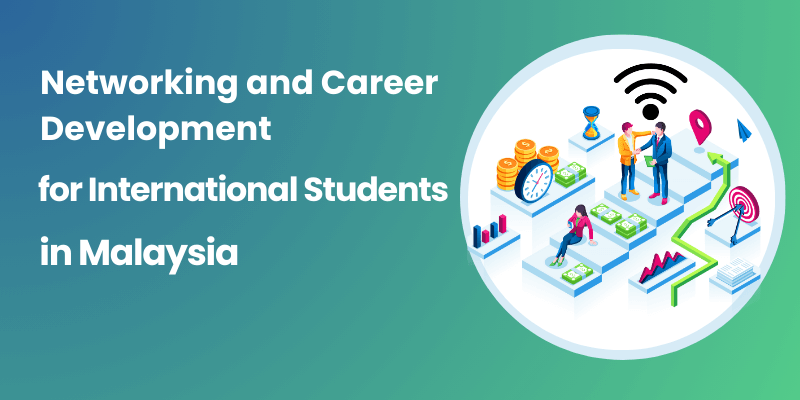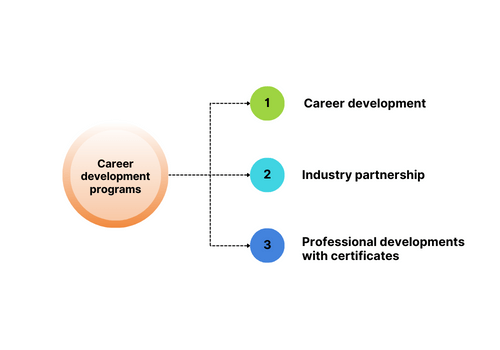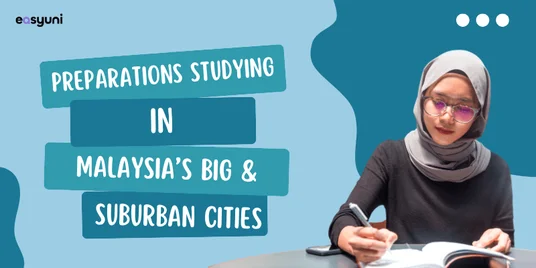Networking and Career Development for International Students in Malaysia
April 17, 2024
Anis

Many international students in Malaysia want to start their careers after completing their studies. However, a common issue they encounter is the challenge of securing employment in the country.
Despite possessing educational credentials from universities in Malaysia, they often struggle due to limited local professional connections and a lack of familiarity with the local work culture.
So, international students who hope to establish themselves professionally in Malaysia must actively build local networks and gain insights into the differences of the Malaysian working landscape.
In the article, we will explore the important aspects of networking and career development for international students in Malaysia.
What are career development programs for international students at universities in Malaysia?

Malaysia's universities have recognized the growing demand for skilled professionals. They are committed to offering comprehensive career development programs to support their students' professional and personal growth.
These programs are designed to cater to the diverse needs of all students, including international students, in response to the global demand for skilled professionals.
Notably, Malaysian tertiary institutions organize a variety of career development programs tailored to student needs, including:
1. Career development
This program aims to equip future graduates with essential career development tools and support.
Tailored to students' academic paths, career development at universities in Malaysia provide assistance to enhance students' personal and professional development, thereby increasing their employability.
Support services may include workshops on writing curriculum vitae (CVs), creating online portfolios, and conducting interview workshops.
2. Industry partnership
Universities in Malaysia collaborate with industry partners to prepare their graduates for future employment.
Seeking professional advice from industry partners helps universities align their academic offerings with real-world issues and solutions, meeting industry needs and demands.
This partnership ensures graduates are well-equipped to become valuable employees in their respective fields.
3. Professional developments with certificates
Professional development programs offer supplementary training and certification to experienced workers, facilitating career advancement.
These programs enable participants to acquire in-demand skills through on-the-job training, college courses, conferences, and other avenues.
For instance, with a focus on corporate training, participants gain valuable insights into improving their business and social skills in English.
Additionally, programs such as English for research and English language teaching provide specialized knowledge to enhance career prospects.
These university programs provide invaluable insights for international students interested in Malaysia's job market and working culture.
Given the slight differences between learning and working cultures in Malaysia, these programs are particularly beneficial for international students aiming to pursue careers in the country after graduation.
What role does cultural understanding play in career development for international students in Malaysia?
Understanding cultural norms in both academic and professional settings requires some time.
In universities, assessments can be individual or group-based, with marks reflecting individual or collective performance.
While teamwork is also essential at a workplace, failure to deliver best working performance may lead to repercussions, including project delays or dismissal.
Some aspects of Malaysian work culture include flexibility towards deadlines. In Malaysian culture, setting a deadline is more like a guideline for workers to complete tasks.
Additionally, Malaysian workers prioritize maintaining harmony in the workplace and typically avoid publicly criticizing their colleagues.
Therefore, understanding Malaysian working culture is vital for international students' career development. This knowledge prepares them to navigate workplace dynamics and fosters professional growth.
1. Demonstrate respects for local cultures
Cultural understanding serves as a bridge that influences communication, relationships, and the creation of a positive environment.
By acknowledging and respecting Malaysian customs, traditions, and social norms, international students can establish rapport with colleagues and employers, earning their trust and respect.
Respecting local cultures also involves adapting to Malaysian workplace etiquette and practices.
This includes understanding the importance of hierarchy, addressing individuals with appropriate titles, and adhering to local customs regarding greetings and gestures.
By demonstrating cultural sensitivity, international students signal their willingness to integrate into the Malaysian work landscape, enhancing their acceptance and credibility within the workplace.
2. Create positive working environment
By appreciating and respecting Malaysian customs, traditions, and social norms, international students can contribute to a harmonious workplace atmosphere.
This understanding allows students to navigate cultural differences effectively, promoting clear communication and reducing misunderstandings among colleagues.
Additionally, by demonstrating respect for Malaysian culture, students build trust and rapport with their peers and supervisors, fostering a sense of inclusion and belonging within the workplace.
3. Communicate effectively
By respecting Malaysian customs, traditions, and social norms, international students can contribute to a harmonious workplace atmosphere.
They need to adapt their behavior to align with local norms to demonstrate respect for the culture and create a positive impression among their colleagues.
This fosters mutual understanding and cooperation, building trust and rapport within the workplace.
Additionally, working in Malaysia also helps improve their language proficiency in Bahasa Melayu and English. It enhances communication and shows respect for colleagues' native language, strengthening relationships.
4. Tailor resume and job application to local market

Understanding norms and culture in Malaysia helps international students tailor resumes and job applications to the local market.
They must recognize the preferences and expectations of Malaysian employers to effectively showcase their skills and experiences.
International students can format their resumes to be well-organized, concise, and appropriate.
Cultural understanding also assists them in using proper and familiar terminology in the local job market, such as emphasizing qualities like teamwork and adaptability, highly valued in Malaysian workplaces.
Moreover, cultural understanding enables international students to tailor job applications to specific industries or sectors, each with its own working culture and expectations.
Being aware of these nuances helps them customize their applications accordingly.
5. Prepare for local job interviews

Preparing for local job interviews in Malaysia requires a deep understanding of the cultural nuances and expectations of the Malaysian workplace.
International students must familiarize themselves with Malaysian business etiquette, communication styles, and interview practices to succeed in the competitive job market.
Cultural understanding guides international students in presenting themselves professionally and appropriately during job interviews.
This includes dressing conservatively, using polite language, and addressing interviewers with appropriate titles.
By adhering to these cultural norms, international students can convey respect and professionalism, which are highly regarded in Malaysian workplaces.
How can international students find internship and work opportunities in Malaysia?
Securing internships and work opportunities can pose challenges for international students in Malaysia.
Common hurdles include visa and work permit restrictions, language barriers, and limited job openings.
However, students can enhance their chances by utilizing various platforms and strategies:
1. Universities career services
Career development at universities in Malaysia offer services to assist international students in finding internships and job placements tailored to their academic and professional aspirations.
These career services are invaluable resources, leveraging universities' extensive networks with local and multinational companies or organizations.
Through partnerships and collaborations, universities facilitate access to a wide range of internship and job opportunities across various industries.
This provides students with the opportunity to foster meaningful connections within the professional community.
Additionally, university career services offer personalized guidance and support to students throughout their job search journey.
2. Online job portals
In addition to the career development services offered by universities, international students can enhance their job search by creating profiles on online job portals.
These platforms regularly advertise internship and job vacancies across various industries, providing students with a convenient way to explore relevant opportunities and apply for positions.
Setting up a profile and applying for positions may seem straightforward, but there are common mistakes that could hinder success. Neglecting to include important keywords and lacking customization are two such errors that many overlook.
In today's technology-driven era, many employers rely on specific keywords to filter through candidate profiles on job portals.
These keywords are typically related to job titles, skills, qualifications, and industry-specific terms.
For example, a candidate applying for a graphic designer position should include keywords such as "Adobe Illustrator," "logo design," and "graphic formatting" in their profile.
Without relevant keywords, their profile may not appear in search results, reducing their visibility to potential employers.
Another common mistake is sending generic applications and messages to multiple employers without personalization.
This approach can lead to mentioning irrelevant experiences or skills that are not applicable to the job position, giving the impression of disinterest or lack of enthusiasm.
3. Networking events

Networking events, including career fairs and conferences, are typically organized by tertiary institutions in Malaysia.
These events offer valuable opportunities for students to expand their professional connections and explore potential career paths.
Now, the question arises: how can students effectively build connections at these events?
Prior to the event, students should conduct research on the speakers and topics scheduled for the day. This preparation allows them to ask informed questions related to the topics discussed.
Following the conclusion of the event, speakers often stay to answer additional questions from attendees.
Students can capitalize on this opportunity to approach the speaker, initiate conversation, ask follow-up questions, and share their own insights.
Additionally, students can consider connecting with the speaker on online platforms and sending a personalized email expressing gratitude for the valuable insights gained during the event.
4. Company websites
Company websites serve as valuable resources for students seeking internship and job opportunities.
By navigating to the career sections of these websites, students can uncover internship and job openings that may not be advertised elsewhere.
This directly allows the company hiring manager to streamline their recruitment process and attract candidates who are genuinely interested in their organization.
When exploring company websites for potential opportunities, students should pay attention to job postings, internship programs, and any other relevant information provided.
This may include details about the company culture, values, and application requirements. Additionally, students can sign up for job alerts or newsletters to stay informed about new openings as they become available.
Kickstart your education in Malaysia
We'll help you find and apply for your dream university
You might be interested in...
- Raising Awareness of the Threat of Microplastics Pollution on International Mother Earth Day
- Essential Tips for International Students Studying in Malaysia's Big and Suburban Cities
- Misconceptions About Studying in Malaysia: Insights for International Students
- The Role of Education in Promoting Health Equity: Lessons from World Health Day 2024
- Studying Abroad Tips: What Should You Do Before Coming to Malaysia?
- International Students' Guide to Success in Malaysian Research Programs
- Returning Home or Staying Put: Planning Your Career Path After Studying in Malaysia
- Crafting a Greener Tomorrow: Empowering Change through Zero Waste and Upcycling Practices
- Malaysian Higher Education's Global Outreach: Collaborations with International Institutions
- Initiatives by Universities in Malaysia to Prepare Students for Globalization








